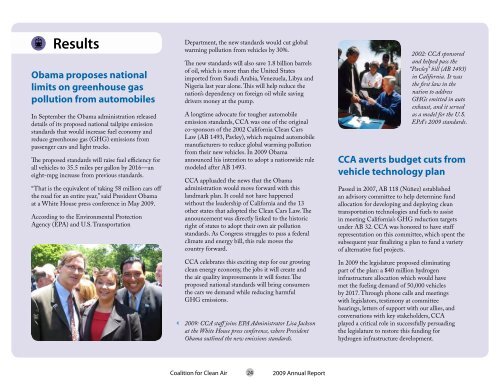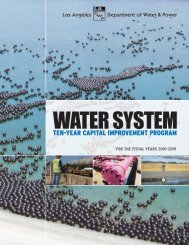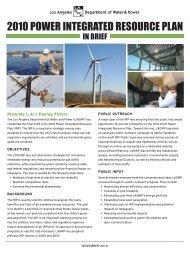The Road To Clean aiR - LA Differentiated
The Road To Clean aiR - LA Differentiated
The Road To Clean aiR - LA Differentiated
Create successful ePaper yourself
Turn your PDF publications into a flip-book with our unique Google optimized e-Paper software.
j<br />
<br />
N<br />
c ><br />
Results<br />
Obama proposes national<br />
limits on greenhouse gas<br />
pollution from automobiles<br />
In September the Obama administration released<br />
details of its proposed national tailpipe emission<br />
standards that would increase fuel economy and<br />
reduce greenhouse gas (GHG) emissions from<br />
passenger cars and light trucks.<br />
<strong>The</strong> proposed standards will raise fuel efficiency for<br />
all vehicles to 35.5 miles per gallon by 2016—an<br />
eight-mpg increase from previous standards.<br />
“That is the equivalent of taking 58 million cars off<br />
the road for an entire year,” said President Obama<br />
at a White House press conference in May 2009.<br />
According to the Environmental Protection<br />
Agency (EPA) and U.S. Transportation<br />
Department, the new standards would cut global<br />
warming pollution from vehicles by 30%.<br />
<strong>The</strong> new standards will also save 1.8 billion barrels<br />
of oil, which is more than the United States<br />
imported from Saudi Arabia, Venezuela, Libya and<br />
Nigeria last year alone. This will help reduce the<br />
nation’s dependency on foreign oil while saving<br />
drivers money at the pump.<br />
A longtime advocate for tougher automobile<br />
emission standards, CCA was one of the original<br />
co-sponsors of the 2002 California <strong>Clean</strong> Cars<br />
Law (AB 1493, Pavley), which required automobile<br />
manufacturers to reduce global warming pollution<br />
from their new vehicles. In 2009 Obama<br />
announced his intention to adopt a nationwide rule<br />
modeled after AB 1493.<br />
CCA appluaded the news that the Obama<br />
administration would move forward with this<br />
landmark plan. It could not have happened<br />
without the leadership of California and the 13<br />
other states that adopted the <strong>Clean</strong> Cars Law. <strong>The</strong><br />
announcement was directly linked to the historic<br />
right of states to adopt their own air pollution<br />
standards. As Congress struggles to pass a federal<br />
climate and energy bill, this rule moves the<br />
country forward.<br />
2002: CCA sponsored<br />
and helped pass the<br />
“Pavley” bill (AB 1493)<br />
in California. It was<br />
the first law in the<br />
nation to address<br />
GHGs emitted in auto<br />
exhaust, and it served<br />
as a model for the U.S.<br />
EPA’s 2009 standards.<br />
CCA averts budget cuts from<br />
vehicle technology plan<br />
Passed in 2007, AB 118 (Núñez) established<br />
an advisory committee to help determine fund<br />
allocation for developing and deploying clean<br />
transportation technologies and fuels to assist<br />
in meeting California’s GHG reduction targets<br />
under AB 32. CCA was honored to have staff<br />
representation on this committee, which spent the<br />
subsequent year finalizing a plan to fund a variety<br />
of alternative fuel projects.<br />
<br />
CCA celebrates this exciting step for our growing<br />
clean energy economy, the jobs it will create and<br />
the air quality improvements it will foster. <strong>The</strong><br />
proposed national standards will bring consumers<br />
the cars we demand while reducing harmful<br />
GHG emissions.<br />
2009: CCA staff joins EPA Administrator Lisa Jackson<br />
at the White House press conference, where President<br />
Obama outlined the new emissions standards.<br />
In 2009 the legislature proposed eliminating<br />
part of the plan: a $40 million hydrogen<br />
infrastructure allocation which would have<br />
met the fueling demand of 50,000 vehicles<br />
by 2017. Through phone calls and meetings<br />
with legislators, testimony at committee<br />
hearings, letters of support with our allies, and<br />
conversations with key stakeholders, CCA<br />
played a critical role in successfully persuading<br />
the legislature to restore this funding for<br />
hydrogen infrastructure development.<br />
Coalition for <strong>Clean</strong> Air<br />
24<br />
2009 Annual Report





